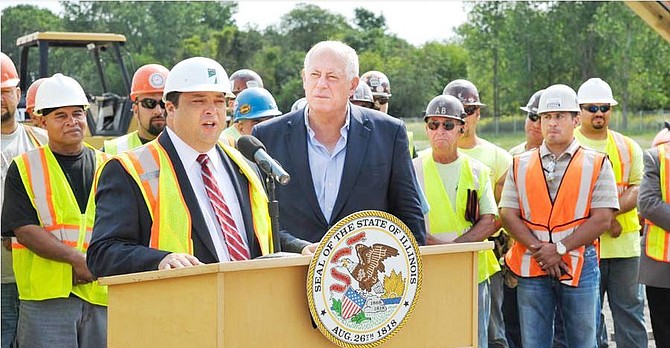Illinois Highways I-294 and I-57 to be Connected
In a conjoined effort, the Illinois Department of Transportation (IDOT) and the Illinois Tollway has begun construction on creating connections and on-ramps between the Illinois Tollway operated I-294 highway and the IDOT operated I-57 highway. The construction is set to begin between I-294 and I-57 and at 147th Street.
Highway I-57 is the longest interstate highway in the state at 386 miles and does not charge a fare for motorist; I-294, in comparison, is 53 miles long and charges motorists on average six cents per mile.
“The proposed interchange has been studied since 1992 and through the years, has been supported by more than 20 communities and transportation agencies, including designation as a regional priority in Chicago Metropolitan Agency for Planning’s (CMAP) 2040 Regional Plan,” said Illinois Tollway Press Secretary Joelle McGinnis.
The merger between the two interstates does not, however, mean that I-57 will become a tollway. According to Illinois Department of Transportation Chief Communications Officer Jae Miller, “At this present time, there are no plans to make I-57 a tollway.”
“From day one, I have made economic development in the south suburbs a top priority,” Governor Quinn said. “This interchange project will create thousands of good-paying jobs and generate economic development throughout the region for future generations.”
“Once complete, this interchange will provide the Southland with many benefits for years to come,” U.S. Representative Robin Kelly said. “Motorists will be able to reach more places quicker and easier. Existing businesses will enjoy improved access to highways in all directions. And local municipalities – particularly Harvey, Markham, Dixmoor and Posen – will find themselves more attractive to new developers. That’s a winning combination.”
Phase One of the project has a budget of approximately $185 million created by the Illinois Tollway's Move Illinois capital program and Ill. Gov. Pat Quinn’s Illinois Jobs Now! capital program. Both agencies have pledged 22.2 percent of the total budget to be set aside for disadvantage minority enterprises. The Illinois Tollway is estimating that during Phase One, nearly 3,300 jobs will be created or sustained; 110 workers will be necessary every day at the work site; the completion date for the project is set at 2014.
Once completed, there will be several benefits to the conjoined interstate highway such as 76,000 vehicles per day will be able to travel between the connection; direct freight access to Chicago’s south suburbs; Tri-State Tollway drivers to save allow 25 travel hours per year and motorists will save $4 million annually
Ill. State Rep. Bob Rita (Dist. – 28th) reiterated to the Chicago Citizen Newspaper the impact of the connection between the two interstate highways stating that, “It’s been something that has been talked about for over three decades.”
Rita has been working closely on this project stating that the benefit of the connection helps local South Suburban cities and municipalities as well.
“It takes the trucks off the local roads, to take the wear and tear off of these municipalities,” Rita said.
“Thanks to the leadership of Governor Pat Quinn, this project is moving forward, creating jobs and the promise of increased economic development and improved access to the Chicago Southland,” Illinois Tollway Executive Director Kristi Lafleur said. “New construction is creating economic benefits now and, when complete, this interchange will improve freight-to-rail connections, expand this region’s multimodal network and help continue to stimulate our state’s economy for years to come.”
“Similar to the loan program offered by the Illinois Department of Transportation as a result of HB 3267, the Tollway has partnered with the Illinois Finance Authority (IFA) and the Chicago Community Loan Fund (CCLF) to offer the Small Contractor Bridge Program, which provides working capital loans to small contractors, including D/M/WBE businesses,” said McGinnis. “The Tollway’s goals for D/M/WBE participation are set on a contract-by-contract basis by the Tollway’s Department of Diversity and Strategic Development, which reports directly to the Tollway’s Executive Director. Once established, contractors commit a portion of their contracts to be achieved through contracting or subcontracting with D/M/WBE firms. The contractors’ D/M/WBE commitments are publicly reviewed as each contract is discussed and approved during the Illinois Tollway Board of Directors’ monthly meetings.”
Latest Stories
- Leaders Network Financial and Great Lakes Credit Union Open Permanent Branch in Austin Neighborhood of Chicago
- DUSABLE MUSEUM TRUSTEE CAROL MOSELEY BRAUN APPOINTED CHAIRMAN OF THE U.S. AFRICAN DEVELOPMENT FOUNDATION
- ASSESSOR HOSTS 2024 MARKET INVESTOR DAY
- One Night Only Performance Show Dance Company Entering ‘New Horizons’
- New Choice Intervention Provides Much Needed Mental Health Services To The Community
- University of Chicago Program Brings Mavis Staples To Campus
- Larry’s Barber College Set For Expansion Of Facility And Education Programs
- Art Exhibit Shows And Tells The Stories Of Widows
- Introducing Shot Bar's New Location
- Illinois Reparations Coalition Advocates for Guaranteed Income Program as Drug War Reparations
Latest Podcast
Sydney Blaylock-The local skater with national experience


